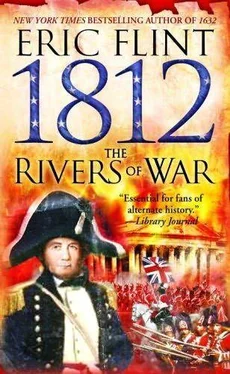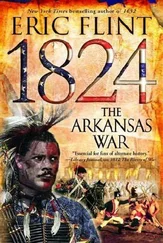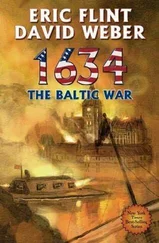Eric Flint - 1812 - The Rivers of War
Здесь есть возможность читать онлайн «Eric Flint - 1812 - The Rivers of War» весь текст электронной книги совершенно бесплатно (целиком полную версию без сокращений). В некоторых случаях можно слушать аудио, скачать через торрент в формате fb2 и присутствует краткое содержание. Жанр: Альтернативная история, на английском языке. Описание произведения, (предисловие) а так же отзывы посетителей доступны на портале библиотеки ЛибКат.
- Название:1812: The Rivers of War
- Автор:
- Жанр:
- Год:неизвестен
- ISBN:нет данных
- Рейтинг книги:4 / 5. Голосов: 1
-
Избранное:Добавить в избранное
- Отзывы:
-
Ваша оценка:
- 80
- 1
- 2
- 3
- 4
- 5
1812: The Rivers of War: краткое содержание, описание и аннотация
Предлагаем к чтению аннотацию, описание, краткое содержание или предисловие (зависит от того, что написал сам автор книги «1812: The Rivers of War»). Если вы не нашли необходимую информацию о книге — напишите в комментариях, мы постараемся отыскать её.
1812: The Rivers of War — читать онлайн бесплатно полную книгу (весь текст) целиком
Ниже представлен текст книги, разбитый по страницам. Система сохранения места последней прочитанной страницы, позволяет с удобством читать онлайн бесплатно книгу «1812: The Rivers of War», без необходимости каждый раз заново искать на чём Вы остановились. Поставьте закладку, и сможете в любой момент перейти на страницу, на которой закончили чтение.
Интервал:
Закладка:
"Form a line, damn you! Form a line!"
Most of Sam's men began to do so. But, with a sick feeling in his stomach, he could see they wouldn't manage it in time. The British had already formed their own line facing him, and their muskets were coming up for a volley.
There was a crash like thunder, and the sight of the enemy was obscured by a huge cloud of gunsmoke. At least a dozen of the American soldiers were struck, many of them knocked flat to the ground.
It was a real, hammering, professional soldiers' volley. For a moment, Sam was sure he'd see his volunteers crumple under the blow.
Yet, they didn't. Their responding volley, fired at Sam's command, was a ragged thing. But it was fired nonetheless-and even the men who hadn't joined the volley were still blazing away on their own. Not one soldier, as far as Sam could see, was even thinking about running away.
Glory be.
Under most circumstances, they would have. But their fighting spirits were high, and they could sense a victory in the offing. Houston's men had driven off the Eighty-fifth, and hounded them down the road-and now, by God, they wanted some real blood.
So, for the next three minutes, a half mob of American soldiers exchanged ragged half volleys and individual fire for the professional volleys that were coming from the enemy. It should have been no contest at all, but it was turned into one by the sheer determination of the amateurs.
Sam never did bring any real order to his ranks during that stretch. He didn't even try, after the first half a minute, realizing that he had no time, and he'd most likely just confuse his men. He simply stood his ground and kept bellowing the order to fire.
A meaningless order, in itself, since his men had every intention of firing anyway. But he'd been told that if a commander was seen to be resolute by his men-sounded resolute, anyway; the gunsmoke covering the field made "seeing" almost meaningless-that their spirits would be bolstered.
It seemed to work, too.
Then the six-pounder and the three-pounders opened up, and grapeshot started tearing at the Eighty-fifth's flank. Finally, finally-Sam thought almost all of their officers were dead or injured by now, except low-ranked ones-the regiment gave way.
Even then, they weren't routed. But the Eighty-fifth had had enough. Their retreat off the field and back to the barges waiting downriver was as precipitous as you could ask for.
Pakenham finally stopped pounding the tree trunk.
"The Eighty-fifth is in full retreat, sir."
"Yes, I can see that." The view across the river was quite good, even without a glass, now that the mist had burned away.
The battle was lost. Today's battle, at least. There was no chance-certainly not at this late hour-that a charge across Chalmette field could carry the day.
Perhaps tomorrow. The Forty-third and the West Indians were still in the fray. Perhaps if they seized that battery -finally!- something might be possible on the morrow.
"Tell the men to stand down. There will be no assault today."
Jackson just stared, from the window of the Macarty house. He'd finally come to realize that the British attack across the river had been no feint at all. No diversion. Houston had driven back one of their regiments, but at least two others were still in action. The only thing standing in their way, beyond Houston's few hundred men, were Driscol and his battalion.
Why hadn't he recognized the danger that the British might go for Patterson's guns? He cursed himself for an idiot.
The curses were silent, of course. Andrew Jackson was as good at cursing himself as he was at cursing anyone else. But he didn't do it out loud. He might be an idiot, from time to time, but he wasn't a blasted fool.
Tiana rose from her chair and went to stand by the riverbank. Ross remained seated, staring at an empty teacup. The noise from the south was like a constant roll of thunder.
TheRiversofWar
CHAPTER 48
The ironwork Driscol's men had embedded in their breastworks did stall the British charge just that extra bit. The last round of canister, fired from Ball's guns at point-blank range, wreaked havoc on the regiment again.
By now, it was a badly battered regiment. But the enemy had arrived and were finally at the throats of their tormentors, and they'd have blood, by God.
Colonel Rennie started up the last little slope, just behind the front rank of his soldiers. Two canister balls ripped open his left thigh, severing the femoral artery. He stumbled and fell, blood gushing like a fountain.
A young officer stooped over him, his face pale and tight.
"Help me up!" Rennie shouted.
"Sir-your leg. We must-"
"Get me up, damn you, or I'll see you hang! Get me up! "
The officer did as he was commanded. The colonel took two steps and was knocked down by a soldier who was falling back. The man's chest had been torn open by a pike blade. It was a hideous wound.
"Get me up!" Rennie shouted again.
The officer did as he was told. Rennie stood, and started to raise his sword. But the blood loss from a severed femoral is enormous, in a very short time. His face suddenly turned white, his eyes rolled up, and he collapsed in a heap.
The young officer's desperate attempt to staunch the mortal wound would have been hopeless, even if the body of another soldier falling back from the rampart hadn't knocked him aside and left him pinned for half a minute before he could get back to his stricken commander.
The fight at the line of the guns was as ferocious a hand-to-hand melee as any Driscol had ever known. Hundreds of men, stabbing and hacking each other with bayonets, pikes, and the motley assortment of blades the Iron Battalion had managed to acquire.
Charles Ball proved as adept with his cutlass as with his tongue. Not that he ever stopped using the first.
"Give it to 'em, boys, give it to 'em good!"
Henry Crowell was astonished to see a British soldier clamber over the writhing body of another soldier who'd gotten impaled on the ironwork. So astonished that he didn't even feel any fear when he saw the man was preparing to leap at him with his bayonet extended.
The big teamster's position as spongeman for his gun crew was just in front and to the right of the twelve-pounder. Henry stepped back a pace and shifted his grip on the sponge staff he'd been using to swab out the cannon and ram in another ball. When the redcoat came flying at him, he just swatted him aside. He had the reach on the man and, as strong as he was, the fact that the ramrod's tip was covered with tightly wound fabric simply didn't matter. The British soldier, stunned by the impact, slammed into two other redcoats who were struggling over the ironwork. The invader's musket sailed out of his hands, and the only damage the bayonet did was spearing yet another British soldier in the calf as he tried to get over the barricade.
There was something insane about it all. Despite his immense strength, the teamster was fundamentally a gentle man. He'd hardly been in any fights in his life, and those only when he was a boy.
But this wasn't really a "fight," in any sense of the term that Henry understood. It was just a huge, crazed melee where hundreds of men who didn't even know one another were doing their level best to commit murder and mayhem.
Even a racial element was absent, to give it any logic. A lot of the men coming at him in red uniforms were West Indians, as black as he was.
Yet another British soldier clambered over the same poor fellow stuck on the ironwork. If this kept up, the man would be killed by his own mates, driving his chest further and further onto the dull ornamental spearpoints.
Some part of Henry's mind felt sorry for him. Most of it, though, was concentrated on the task at hand. By now, so many men of the Iron Battalion were pressing forward to help repel the enemy that he realized he couldn't keep using the sponge staff as a club.
Читать дальшеИнтервал:
Закладка:
Похожие книги на «1812: The Rivers of War»
Представляем Вашему вниманию похожие книги на «1812: The Rivers of War» списком для выбора. Мы отобрали схожую по названию и смыслу литературу в надежде предоставить читателям больше вариантов отыскать новые, интересные, ещё непрочитанные произведения.
Обсуждение, отзывы о книге «1812: The Rivers of War» и просто собственные мнения читателей. Оставьте ваши комментарии, напишите, что Вы думаете о произведении, его смысле или главных героях. Укажите что конкретно понравилось, а что нет, и почему Вы так считаете.











